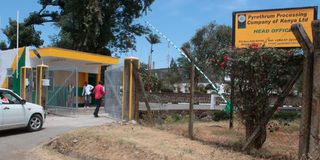Premium
Nearly half of staff at Pyrethrum Company from one ethnic community, audit reveals

The main entrance to the Pyrethrum Processing Company of Kenya Ltd in Nakuru.
Nearly half of the staff at the Pyrethrum Processing Company of Kenya are from one ethnic community, in breach of a legal requirement for diversity in public appointments.
A report by Auditor-General Nancy Gathungu, tabled in Parliament last week, shows that 38 per cent of the company's employees are from one community, in breach of the law. However, the report did not identify the community in question.
"A review of the ethnic composition of the company's employees revealed that a single ethnic community represented 38 per cent of the employees, in contravention of the law," reads part of the report, which covers the 2021/2022 financial year.
"This is in contravention of Section 7(1) and (2) of the National Cohesion and Integration Act, 2008, which states that all offices shall endeavour to represent the diversity of the people of Kenya in the employment of staff and that no public office shall have more than one-third of its staff from the same community," Ms Gathungu added.
This means that almost half of the more than 300 employees are from one tribe.
In addition, a review of records showed that the Pyrethrum Processing Company of Kenya had not developed a new human resources policy, but relied on one developed in 2010 by the defunct Pyrethrum Board of Kenya.
The dominance of the undisclosed tribe violates the National Cohesion and Integration Act, 2008, which prohibits a single community from occupying more than one-third of employment positions in state-owned enterprises.
"Consequently, management is in breach of the law," Ms Gathungu said in a report on the parastatal's accounts for the year 2021/2022.
The audit findings reflect the Public Service Commission's (PSC) efforts to ensure that the taxpayer-funded offices have a face of Kenya, with all communities given an opportunity to serve.
After the report was tabled in the National Assembly, MPs were able to force the PSC to take action.
Financial state
The report also painted a grim picture of the board's financial affairs. The cash-strapped company, based in Nakuru's industrial area, owes pensioners under the Pyrethrum Board of Kenya Staff Superannuation Scheme Sh2 billion. Some of the former workers have died without receiving their pensions.
The company is also grappling with millions of shillings in unpaid debts to contractors, farmers and other organisations, accumulated over more than a decade.
The audit revealed that the company has a debt of Sh1.3 billion, exposing it to litigation and increased costs of penalties and interest.
"The balance sheet reflects a trade and other payables balance of Sh1,300,741,000. This includes long outstanding unremitted PAYE deductions of Sh155,727,146 and other salary settlements of Sh13.2 million. Unremitted PAYE continues to attract interest and penalties in accordance with the provisions of Section 37(2) of the Income Tax Act Cap 470 of the laws of Kenya," Ms Gathungu said in the report.
"The balance also includes other liabilities to the Agriculture and Food Authority of Sh223 million, the Sugar Directorate (Sh41 million) and the Tea Directorate (Sh16 million). Despite a change of guard that has seen at least six managing directors in the past less than six years, the company continues to struggle as its operations remain largely paralysed.
Auctioneers have also targeted the company's assets in the past to recover some of the money they are owed.
In fact, the frustrated pensioners are demanding the sale of 13 non-core assets spread across Nakuru City to settle their outstanding dues.
In the latest report, the Auditor General raised concerns over the poor management and utilisation of Sh5.5 billion assets belonging to the Nakuru-based Pyrethrum Processing Company of Kenya, even as it pointed out that the state-owned company recorded a negative working capital in the year under review.
Officially established in 1934, the former Pyrethrum Board of Kenya (PBK) - with the best factory, the largest in Africa - tells the story of a dying industry that was part of what was once a lucrative venture for Kenyan farmers.
Today, the company's disused and idle machinery, dilapidated buildings and ageing trucks give the impression of an abandoned historic site.
In her report, Ms Gathungu now points out that the state-owned company is sitting on a Sh305 million pyrethrin extraction plant that was procured 17 years ago but is lying idle.
According to the report, the company's Sh640 million rental houses and offices are in a poor state despite being occupied by paying tenants.
"The company has rental houses and offices valued at Sh640,747,000; however, physical verification revealed that the properties are in a dilapidated state," she said.
However, the report shows that tenants occupying the houses pay a fraction of the rent charged by similar private houses in the same neighbourhoods.
The cash-strapped company is also at risk of losing thousands of acres of prime land worth more than Sh350 million because it does not have the title deeds.
"A review of the records revealed unsatisfactory matters, including 18 plots of land valued at Sh354,340,000 in Nakuru and other pyrethrum growing areas that are not registered in the company's name," said Ms Gathungu.
The Auditor General has therefore raised questions about the use of the plots by other parties without proper documentation of the leases.
"A 35-acre Mawingu farm in Nyandarua is leased to the Agricultural Food Authority (AFA). Documents showing the terms of the lease were not made available for audit," she said.
This means that some of the land may have been grabbed or allocated to individuals.





